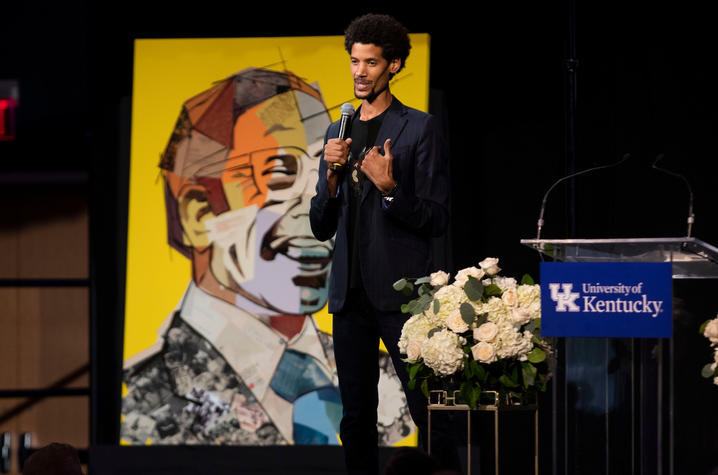Honoring the Legacy of Lyman T. Johnson

Earlier this month, I had the opportunity to attend the University of Kentucky’s annual Lyman T. Johnson Torch of Excellence Awards Luncheon to celebrate UK’s strengthened commitment to diversity and inclusion and commemorate 70 years of integration on campus. I was humbled to be a part of a community with such a compelling vision for inclusion and belonging.
This year is a special one at UK, as we honor a moment and a man who altered our trajectory, and who helped bend the moral arc of our institution toward justice.
Seventy years ago, Lyman T. Johnson became the first African-American student at the University. With courage and dogged determination, he opened this heavy door and inscribed in our history a profound idea: the bold but graceful declaration that anyone — regardless of who they are, the color of their skin, what they believe, how they identify themselves, or where they are from — can find a place at the University of Kentucky.
It certainly was not an easy journey.
In fact, I recently had the opportunity to meet Lyman T. Johnson’s grandson, Imar Hutchins. Imar shared with me that his grandfather often described his life as lived half in the darkness and half in the light. He found this light, however, through the education he received at UK, and he infused that light into the lives of so many he encountered after leaving our campus.
His story reminds us that, in this special place, we are called to teach, to heal, to discover, and to serve. But the ways in which we conduct these labors matter. Our character — the values we instill and uphold — distinguish our community, and I believe that empathy is core to who we are as a university family.
It is our responsibility, in the spirit of Lyman T. Johnson, to infuse light into the journeys of our students, and empower them to do the same.
The years that one spends on a college campus are unlike any other. In fact, for many of our students, this campus is likely the most diverse environment they have ever encountered.
That is powerful.
It is our responsibility to harness that transformative potential to prepare our students for what President Capilouto calls “lives of meaning and purpose.”
This is a place where different ideas and beliefs can be shaped and challenged. It is a place where we can—and should—debate and deliberate, consider and question. But, we must do so with empathy, grace, and civility.
As I’ve learned more about Lyman T. Johnson’s legacy, I’m reminded of a quote from Horace Mann, a pioneer of American public schools in the 19th century, who referred to education as the “great equalizer of the conditions of men.”
How fortunate are we to be gathered on this campus, in a place with such profound, transformative power?
Lyman T. Johnson is a compelling example of that power. He is also a constant reminder of the work we must continue to do, to ensure that education, as the great equalizer, is indeed accessible to all who wish to be a part of this special community.
In other words, we must, in his words, “not let the wagon roll down the hill.”
We are committed to moving forward.
At the same time, perhaps the most impressive component of Lyman T. Johnson’s legacy lives on through his family. Like his grandfather, Imar has pursued a life of meaning and purpose in which his passions take a variety of forms. He is an attorney, as well as a self-taught artist based in Washington, DC. He also owns a restaurant, which I was fortunate enough to visit on a recent trip to see him.
We were fortunate to welcome Imar to share a portrait of his grandfather, an astounding piece of art composed entirely of hate mail. It is a raw and unfiltered perspective on the dark sides of humanity and history. His words were just as raw and real, serving as a reminder of the progress we still have to make within our community.
I am grateful for Imar’s insight, and grateful to serve a campus that continues to make impressive strides to create a place of belonging. In emulating Lyman T. Johnson, we must continue to live a legacy of empathy, integrity, and diligence. We must remain committed in our efforts to create an environment in which everyone—regardless of how they look, what they believe, where they are from, or how they identify—feel a deep sense of value and belonging.




